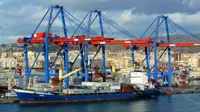BMW slows production of some car models due to parts shortage
30 May 2017
BMW AG, the German luxury car maker, is slowing production of certain models due to a shortage of parts caused by delivery problems at supplier Bosch GmbH, which in turn is finding it difficult to get parts supplies from Italy.
The disruption in the normally smooth operation showed how dependent manufacturers were on a global, smoothly running supply chain. Even small disruptions anywhere along the line could have a cascading effect resulting in delays in getting the company's big money-making products off the assembly line and into showrooms.
In BMW's case, the `Lenkergetriebe,' or steering gears manufactured by Stuttgart-based auto-parts giant Bosch and used in BMW's 1-Series, 2-Series, 3-Series and 4-Series compact cars were the problem.
"Our supplier Bosch is not currently able to provide us with a sufficient number of steering gears," said Markus Duesmann, BMW board member in charge of purchasing and supplier network, Fox Business reported.
According to Bosch, the trouble arose when a supplier in Italy experienced difficulties in delivering the casing for the steering gears. Bosch declined to identify the supplier.
The shortage had led to restricted production at a number of BMW plants in Germany, the Tiexi plant in Shenyang, China, and at the company's plant in Rosslyn, South Africa, a BMW spokesman said.
According to Diederik Reitsma, general manager for group communications at BMW Group South Africa, it was a global problem affecting BMW 1-Series, 2-Series, 3-Series and 4-Series and meant that only limited vehicle production was currently possible at various BMW Group plants in Germany.
According to Reitsma, the Tiexi plant in China and the Rosslyn pant in South Africa had extended or pulled-forward planned interruptions to production, due to the component-supply issue.
He added that this situation, which had affected over 1,000 workers at its Rosslyn plant, was not likely to change this week.
However, according to Reitsma, workers would still be paid, despite their absence as part of the flexibility measures in place at the plant.
























